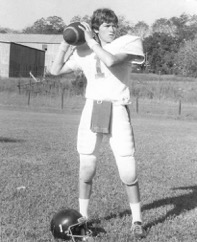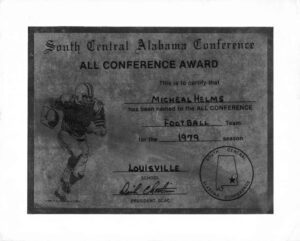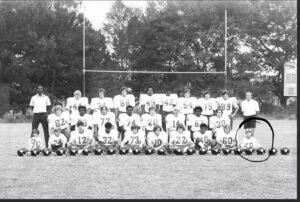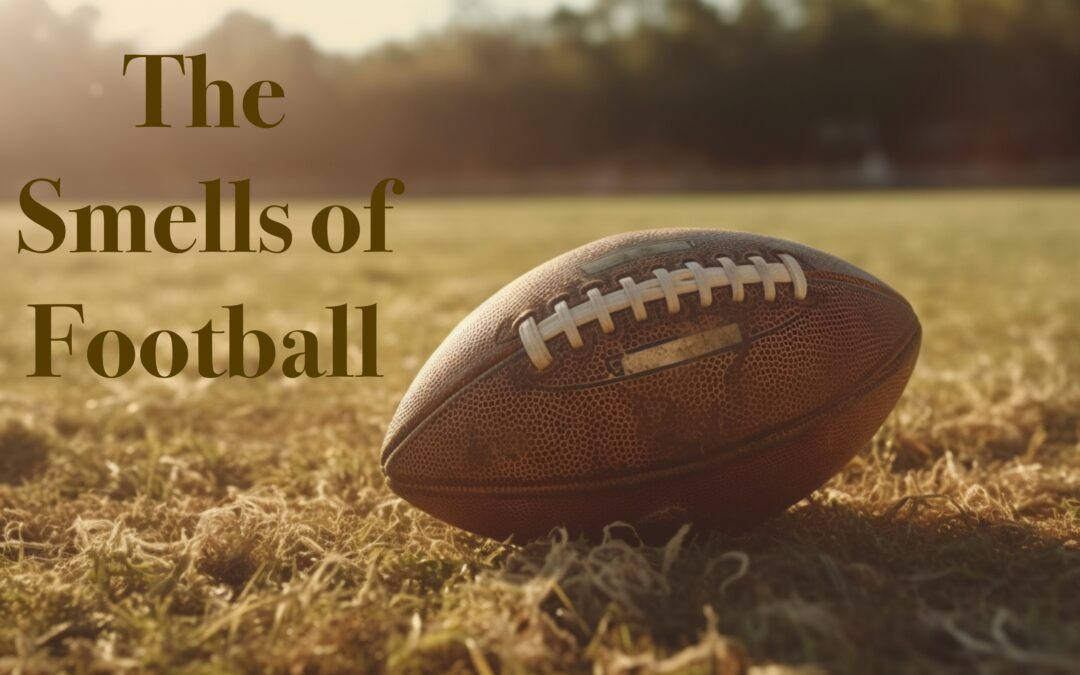The Smells of Football
The scent hit me like a memory bomb—wet grass on a humid morning. I was on my hands and knees pulling weeds from my lawn, but in an instant, I was seventeen again, face-first on a football field, the weight of bodies pressing down, lungs heaving, heart pounding.
It’s funny how smell can do that—take you back without warning, without logic, without even asking permission. One breath of wet grass, and a whole chapter of life reopened.
I spent years around football—as a boy, as a teenager, as a player, and before that, as a team manager. And as I worked in the yard that morning, the smells of those days came back one by one, like teammates walking onto the field.
The Grass and the Grit
You never forget the smell of a football field. You spend enough time on the ground—under a pile of bodies, shoulder pads pressing into your ribs, helmet jammed sideways, your face buried in the turf—and it stays with you. That earthy, damp, grass with a slightly sweet scent is woven into memory like a playbook you’ll never forget. These days, with artificial turf, it’s a smell the new generation will not know.
But even players now know the smell of a wet field. After a heavy rain, nothing is dry—not your socks, not your jersey, not your spirit. That’s when it was easy to tell who’d played and who hadn’t. All you had to do was look at their jersey—and smell it.
I’m reminded of the guy who hadn’t played a down but wanted to impress his girlfriend. He went around after the game asking everyone to wipe mud and dirt on his jersey so he could look like he’d been in the action.
Speaking of girlfriends—those who had one never seemed to mind the post-game hug. Standing there soaked in sweat, with dirt, and a little blood on your jersey, you might catch the scent of her perfume or freshly washed hair. In that moment, with the steam of hot players rising around you, you remembered there was more to life than football.
Few that have played can forget the smell of a sweaty locker room full of players after a game, or the smell of taking your wet, stinking clothes out of your bag the next day to wash them. Sometimes we might practice for days without washing a uniform. As we dressed for practice, we were greeted by the strong odor of the former days of hard work.
The Job Before the Game
Before I ever played a down, I was a manager for the high school team. It was a dream job for a middle school boy—full of motion, grit, and responsibility. I got to attend every practice, travel with the team, and be on the sidelines under the Friday night lights. But it was also hard work. We were given a jersey to wear on game day, but it was so big you could not read the numbers.
I ran errands for coaches, set up blocking dummies, kept the water buckets full, and rushed water to players during games along with the two other managers. That was our big moment. We stepped out on the dance floor and into the loose huddle to see the players we aspired to be. For once, they were glad to see us. They grabbed our water like they were a team lost in a desert.

The Medicine Kit
The managers were responsible for the medicine kit. That old box held more than just supplies. It held power. And smell.
Smelling salts were tucked inside—used to jolt a player back to awareness after a hard hit. They’ve fallen out of favor now, and rightly so, but back then, they were standard issue. Just one whiff would cause a player to jerk his head away, eyes fluttering open. It didn’t heal the concussion—but it snapped you back to the moment, ready or not.
We also had heat balm, a fierce-smelling rub for bruises and stiff joints. You had to be careful with it. A little went a long way. Too much and your skin would blister. Put it in the wrong place, and you’d crying and singing a Jerry Lee Lewis hit song. I’ll let you guess which one.
Then there were salt tablets, handed out like tiny shields against muscle cramps in the swelterin g Alabama heat. They had a sharp, mineral tang—chalky, pungent, almost metallic smell that clung to your fingers long after the game was over, but they help you from getting dreaded cramps.
g Alabama heat. They had a sharp, mineral tang—chalky, pungent, almost metallic smell that clung to your fingers long after the game was over, but they help you from getting dreaded cramps.
Even the athletic tape had a scent—part cloth, part rubber-based adhesive. It filled locker rooms and training benches with its sticky, sterile presence. You couldn’t mistake it.
Before every game, Ricky Clark and I made sure the medicine kit was ready and during the game it was on the sidelines ready to be opened and used at a moment’s notice.
A Kit with a Legacy
One afternoon, cutting through the school grounds near my house, I saw the medicine kit discarded in the trash. Its bottom was coming loose. I pulled it out and carried it home.
I taped it up, and for years, my grandfather used it to store small tools. After he died, I found it again, tucked away in the old smokehouse. The black cloth covering was tattered, so I peeled it off. Underneath was oak—solid and beautiful. I sanded and stained the wood and gave the box a new life.
For decades, it became my makeup kit for clown performances. I’d open it, breathe in the smell of wood, and somewhere beneath that, I could still sense the faint residue of balm, salt, sweat, and tape.
I’ve since retired my clown character. But the box remains—a touchstone. A relic. A little piece of Louisville High School history.
When I pass that box down to whomever, I know those smells will not come pouring out for them, because that’s not how memory works. But for now, as long as I can still smell the grass, and open up the old medicine box, I know I’ll still smell football.

